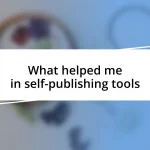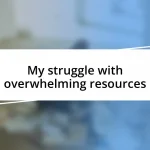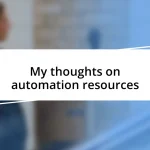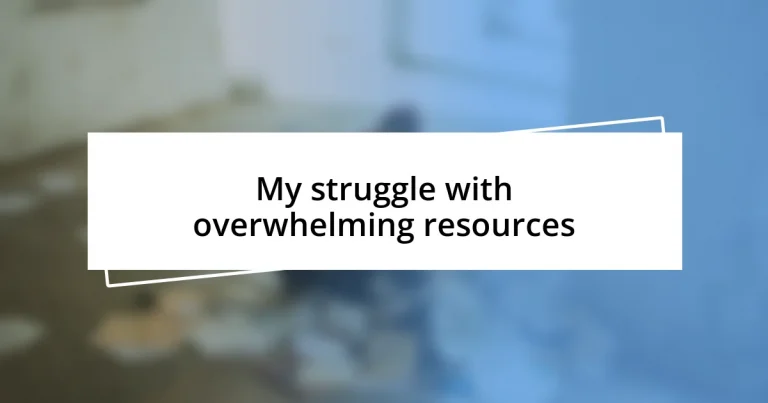Key takeaways:
- Managing overwhelming resources requires prioritizing needs, breaking down information into manageable chunks, and employing the Eisenhower Matrix for effective task categorization.
- Establishing sustainable routines, such as setting dedicated times for focused work and reflecting on progress, helps prevent information overload and enhances productivity.
- Seeking support through community and mentorship fosters connection, provides new perspectives, and encourages celebration of small wins to boost motivation and progress.
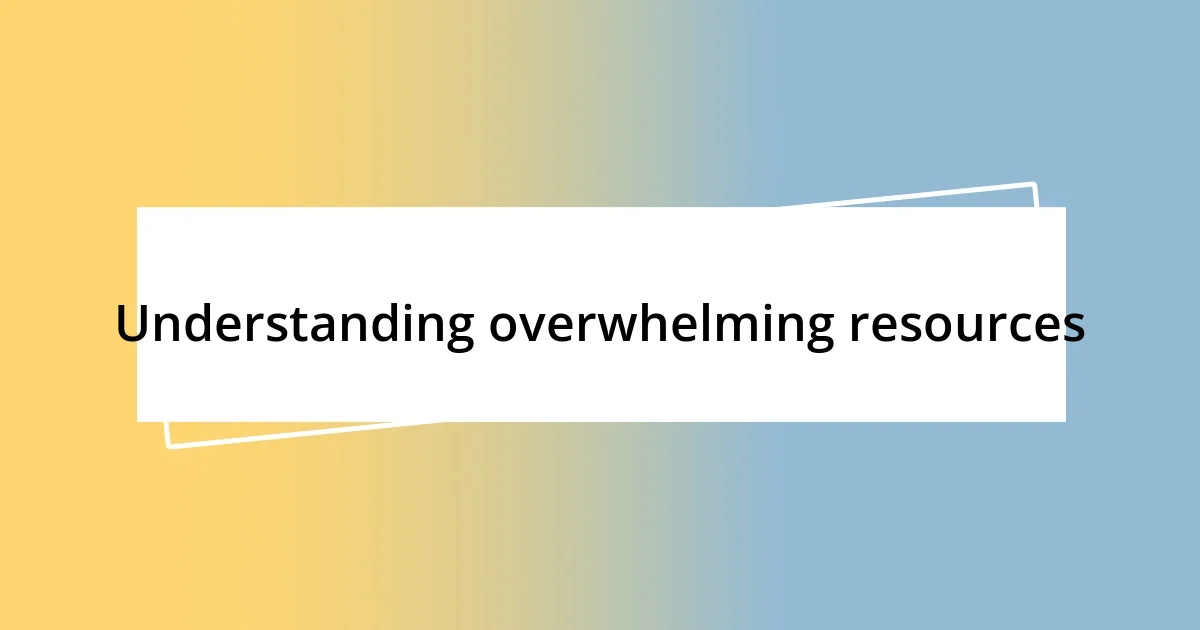
Understanding overwhelming resources
Understanding overwhelming resources can be a bit daunting. I remember when I first encountered a mountain of information while working on a project. It felt like standing at the edge of a vast ocean, not knowing where to start. How do you even begin to sift through everything?
As I navigated through those resources, I realized that it’s easy to feel lost among the endless options available. At times, I questioned my own capabilities—was I missing out on something crucial? This emotional turmoil reminded me that clarity often comes from focusing on what truly matters, rather than trying to absorb everything at once.
Ultimately, it’s about identifying the key pieces that align with your needs. I’ve learned to prioritize resources based on relevance and trustworthiness. How do you manage your resource overload? Finding a balance has become my secret weapon. Embracing a more measured approach has transformed my relationship with information from feeling overwhelmed to feeling empowered.

Identifying your personal triggers
Identifying your personal triggers can be a game-changer in managing overwhelming resources. I used to notice that certain topics made my anxiety spike, pulling my attention away from what I really needed to focus on. For instance, every time I dove into technical resources, I felt a wave of self-doubt. Recognizing this emotional response has helped me avoid those situations when I need to maintain my focus and calm.
It’s fascinating how our environments can influence our capacity to process information. I’ve found that cluttered spaces or too many notifications lead to a struggle in digesting material. Reflecting on my workspace, I began to declutter not just my physical environment, but also my digital one. Gradually, the clarity allowed me to hone in on what matters most, rather than get lost in irrelevant details.
Keeping a journal has also been extremely beneficial. By jotting down which resources induce stress and what times of day make me feel overwhelmed, I’ve come to understand my patterns more clearly. This self-reflection has been illuminating, revealing that taking breaks and setting boundaries with information consumption are not just beneficial—they’re necessary.
| Trigger Type | Personal Reaction |
|---|---|
| Technical Topics | Increased self-doubt and anxiety |
| Cluttered Environment | Difficulty in processing information |
| Overwhelming Notifications | Feeling scattered and distracted |
| Emotional Outbursts | Loss of focus and motivation |
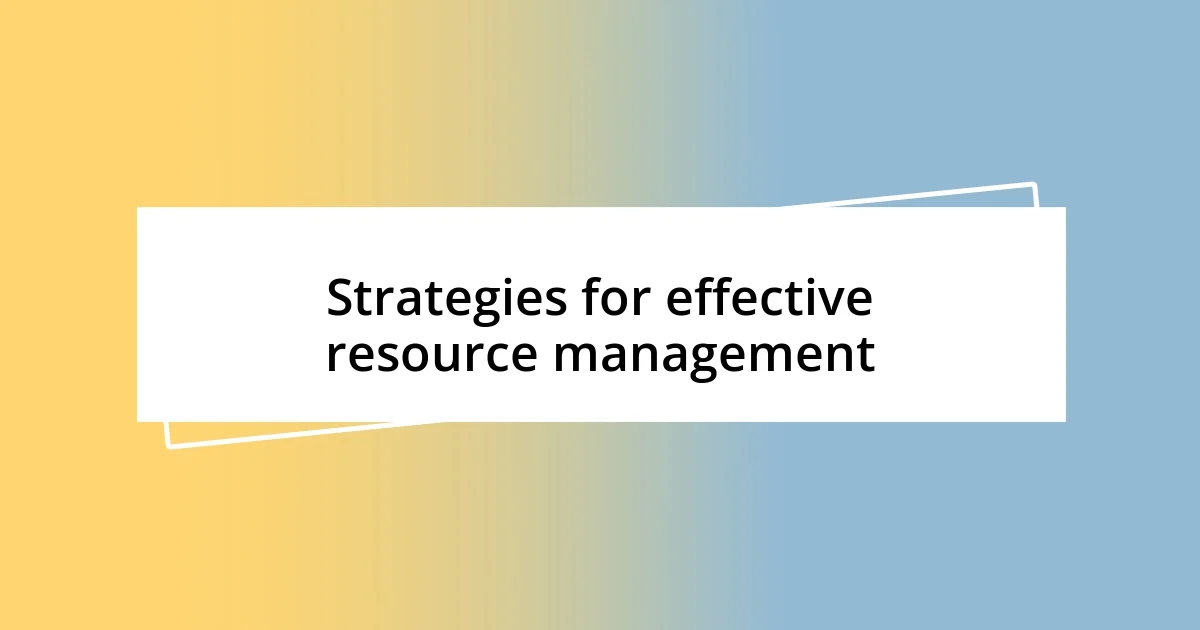
Strategies for effective resource management
Managing resources effectively can feel daunting, but I’ve discovered a few strategies that truly make a difference. One approach I find invaluable is breaking down the resources into manageable chunks. When I feel overwhelmed, I tackle one piece at a time, allowing me to retain focus and make sense of the information. This method not only eases my mind but also gives me a sense of accomplishment as I check each item off my list.
Here are some practical strategies that have worked for me:
- Prioritize Needs: Determine what you truly need before diving into resources.
- Set Specific Goals: Outline clear objectives for what you want to achieve with the resources.
- Limit Consumption Time: Allocate specific times during the day to engage with information and stick to it.
- Utilize Tools: Take advantage of digital tools and apps that can help organize and filter out unnecessary content.
- Reflect Regularly: Take time to evaluate which resources have been most beneficial and adjust your approach accordingly.
By implementing these strategies, I not only regain control over the resources but also create an environment that supports my productivity.
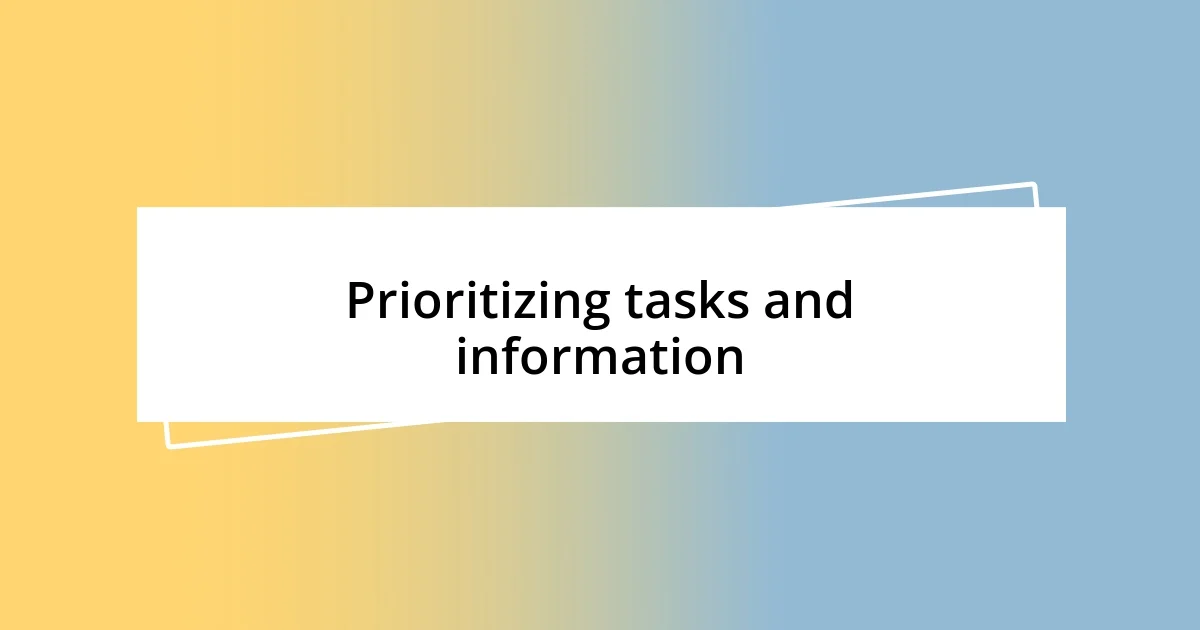
Prioritizing tasks and information
Knowing where to focus my energy has been a pivotal part of managing overwhelming resources. I often jot down tasks and rank them based on urgency and importance—a practice that instantly clarifies my objectives. One quiet evening, as I prepared for a busy week, I realized that prioritizing my reading material transformed my stress into excitement. It felt like finding a treasure map; suddenly, I knew which “X” to chase first.
Sometimes, I question whether I’m prioritizing effectively. I recall a weekend when I attempted to tackle a daunting project while juggling various articles. I found myself flitting between sources, which only led to frustration. After that experience, I started using the “Eisenhower Matrix” to categorize tasks. It’s simple yet effective; sorting tasks into four quadrants—urgent, important, neither urgent nor important—allowed me to see where my focus should lie. This visual tool provided clarity and helped avoid the anxiety that comes with drowning in information.
Periodically, I check in with myself to reassess my priorities. This reflection is key. There have been instances when I allocated too much energy towards less impactful tasks simply because they felt easier. In those moments, I remind myself that not every task carries equal weight. By adjusting my focus and re-evaluating regularly, I maintain a healthier balance and harness my resources more effectively.
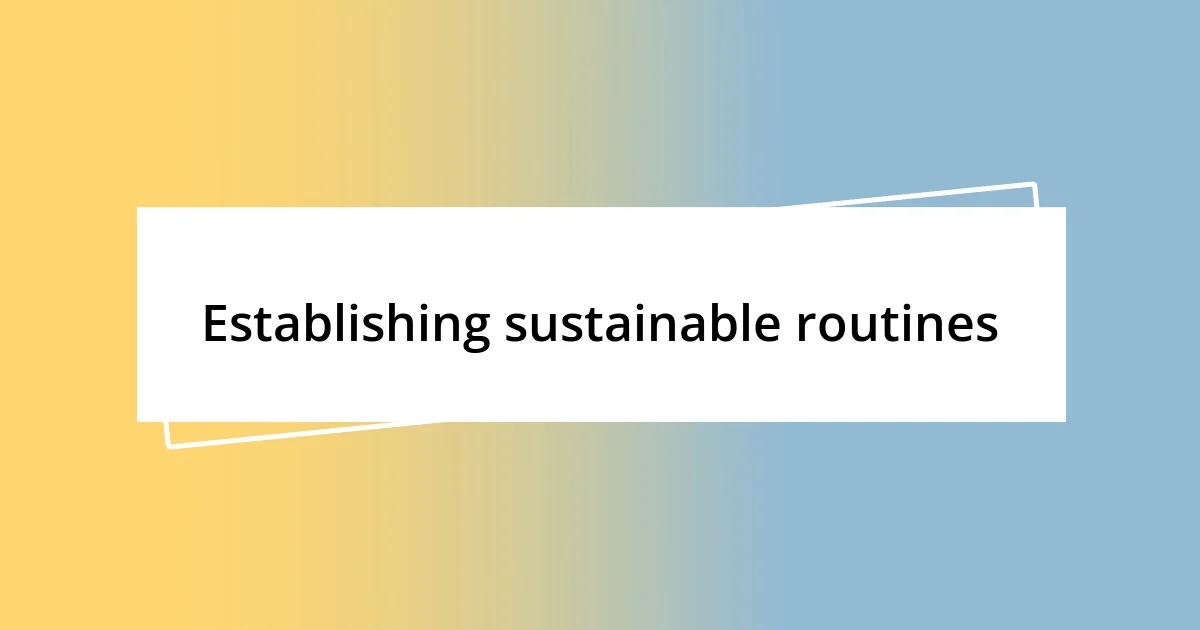
Establishing sustainable routines
Establishing sustainable routines has been my anchor in the sea of overwhelming resources. I’ve found that creating a daily schedule helps me carve out dedicated time for specific tasks. For instance, I remember a hectic week where I was trying to absorb information for a project. I decided to set aside just an hour each morning for focused research, and that simple choice transformed my productivity. It felt liberating, allowing me to engage with content rather than being bombarded by it.
Another aspect I prioritize in my routines is consistency. There’s a real comfort in rituals, don’t you think? I’ve noticed that when I start my day with a structured morning routine—like a cup of coffee alongside reviewing my priorities—I set a positive tone for whatever comes next. I’ve also learned to limit my exposure to resources during the day, allocating only a couple of hours to engage deeply with them. This approach not only prevents information overload but helps me absorb and retain what’s truly important.
Finally, I believe reflection is an essential part of establishing sustainable routines. Each week, I take a moment to look back on what worked and what didn’t. This reflective practice isn’t just about assessing my resource management; it provides a chance to celebrate my wins and learn from my missteps. Have you ever stopped to think about what habits truly serve you? I’ve found that by regularly tuning into my own routines, I can adjust and enhance them to ensure they align with my goals, ultimately making my engagement with resources more intentional and meaningful.
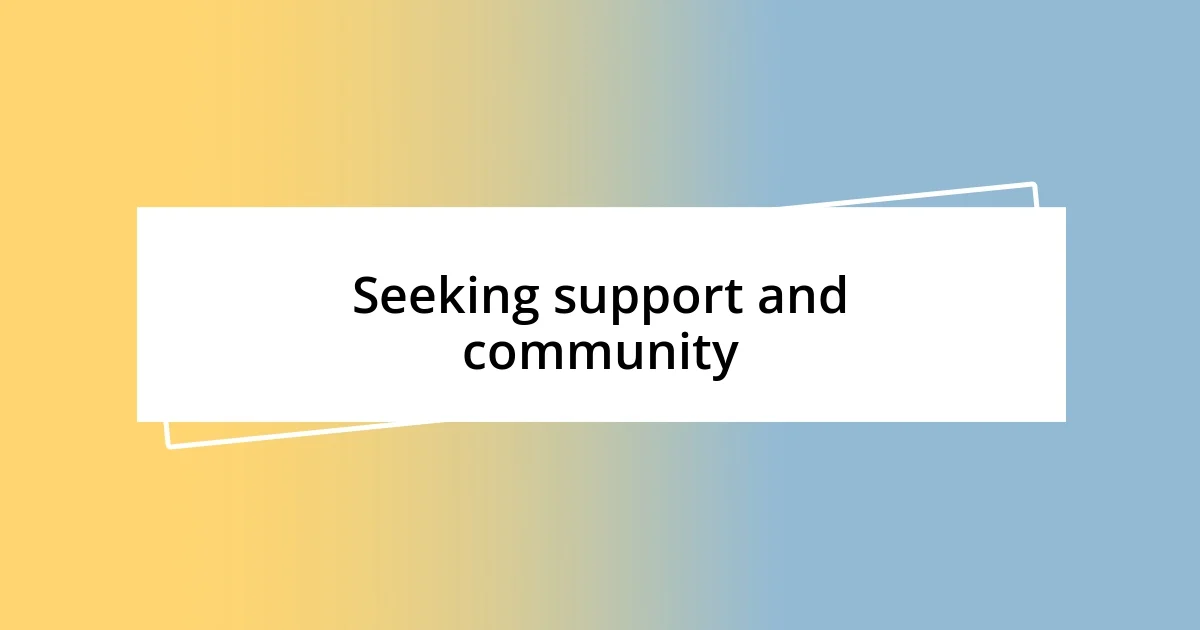
Seeking support and community
Seeking support and community has been a game-changer for me in tackling overwhelming resources. I vividly recall the first time I joined an online forum dedicated to my interests; the exchange of ideas was invigorating. Suddenly, I wasn’t alone in my struggle, and it felt like having an emotional safety net while navigating complex information. Connecting with others who share similar challenges gave me fresh perspectives and fostered a sense of belonging. Isn’t it comforting to know that others are on the same journey?
Additionally, I’ve learned to value the power of mentorship. I’ll never forget the time I reached out to a colleague who had successfully managed similar projects. Their guidance was a lighthouse in my fog of anxiety. I often found myself hanging on their every word during our conversations, from practical tips to emotional support. It made me realize that seeking help isn’t a sign of weakness; it’s a strategic move toward success. What if we all took a moment to ask for help instead of battling through challenges alone?
Exploring local meetups has also enriched my experience. Attending a workshop where I could brainstorm with others revealed how collaboration could simplify things. Sharing resources in a group brought clarity to what felt overwhelming. I felt lighter leaving those sessions, as if I had offloaded some of my burden. Isn’t it true that sometimes, just hearing someone else express your thoughts can be a relief? This sense of community fosters not just growth but also a deeper understanding of the resources at our disposal.
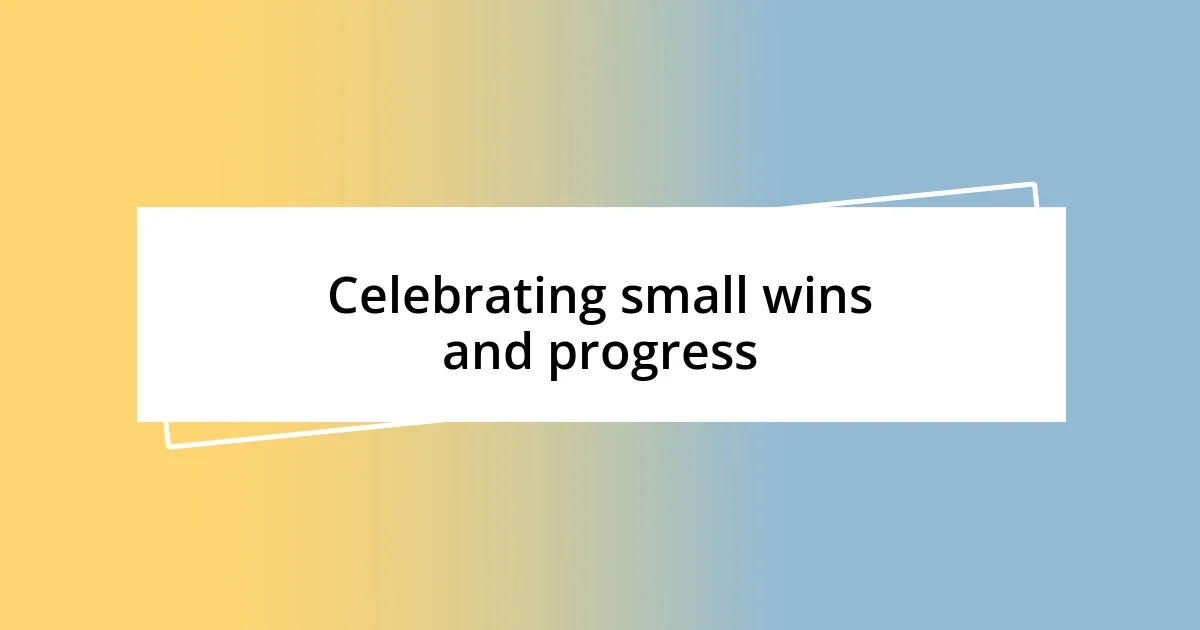
Celebrating small wins and progress
Embracing the concept of celebrating small wins has been transformative for me. I remember a day when I finally tackled a daunting article I had been putting off for weeks. Instead of waiting to finish everything, I allowed myself to celebrate that one completed task. I felt a rush of joy that made me eager to dive into the next item on my list. Isn’t it fascinating how a small acknowledgment can ignite motivation?
These moments of celebration don’t just boost my spirits; they serve as vital markers of my progress. I often find myself jotting down my achievements, no matter how minor they seem. I recall a week when I managed to read just a few chapters of a challenging book. Writing that down gave me a sense of accomplishment, reminding me that every bit of progress counts. Have you tried this practice? It shifts my focus from the mountain of resources ahead to the steady steps I’m taking.
Moreover, sharing these small victories with friends has created a ripple effect in my life. I once texted a close friend about my latest achievement, and their excitement was contagious. Their encouragement inspired me to set even bigger goals. It’s amazing how recognizing and celebrating our efforts—no matter how small—can not only lift our spirits but also strengthen our connections with others. Have you experienced that kind of uplift? I genuinely believe that fostering this culture of celebration can change our perspectives on growth.




